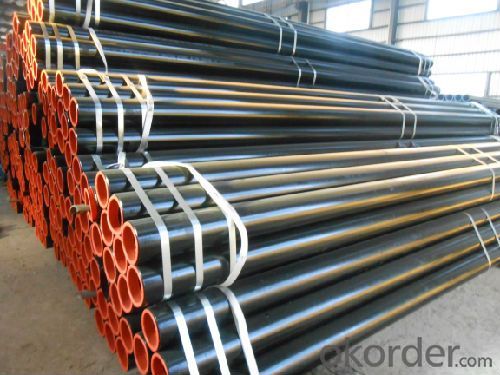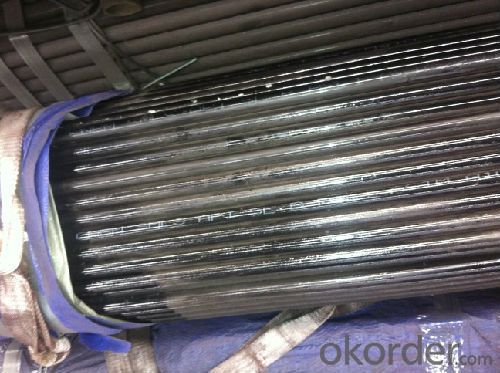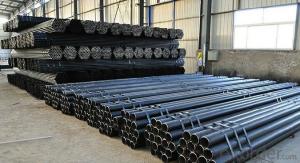Seamless Steel Pipe 2-1/2"
- Loading Port:
- China Main Port
- Payment Terms:
- TT or LC
- Min Order Qty:
- 25-35 m.t.
- Supply Capability:
- -
OKorder Service Pledge
OKorder Financial Service
You Might Also Like
Quick Details
| Thickness: | 4 - 70 mm | Section Shape: | Round | Outer Diameter: | 25 - 377 mm |
| Place of Origin: | Shandong China (Mainland) | Secondary Or Not: | Non-secondary | Application: | Fluid Pipe |
| Technique: | Hot Rolled | Certification: | API | Surface Treatment: | according the customers requirment |
| Special Pipe: | API Pipe | Alloy Or Not: | Non-alloy | Length: | 4-12 m |
| Grade: | 10#,20#,45#,12Cr1MoV,16Mn,A53(A,B),A106(B,C),A333,A192,API J55,API P110,St52,St42,St45-4,10#-45#,Cr-Mo alloy,A53-A369,API J55-API P110,ST35-ST52 | Standard: | GB 5310-1995,GB 3087-1999,GB/T8163,DIN 1629/3,DIN 1629/4,ASTM A106-2006,ASTM A213-2001,API 5CT,GB,DIN,ASTM,API |
Packaging & Delivery
| Packaging Detail: | Packing, Delivery ect.according to customers requirements |
| Delivery Detail: | within 30 work days |
Specifications
1.hot rolling round seamless steel pipe
2. OD-4--70mm. WT:25-377MM
3. certification:API,BV,SGS
4. engaged in 20 years.
Specifications
Carbon Steel Pipes API 5L Gr. X42 / X46 / X52 / X56 / X 60 / X65 PSL1 PSL2
P235GH EN-10216 P235GH+N EN-10216 Seamless Tubes
Seamless Steel Pipe Image


FAQ of Seamless Steel Pipe
①How is the quality of your products?
Our products are manufactured strictly according to national and internaional standard, and we take a test
on every pipe before delivered out. If you want see our quality certifications and all kinds of testing report, please just ask us for it.
Guaranteed: If products’ quality don’t accord to discription as we give or the promise before you place order, we promise 100% refund.
②How about price?
Yes, we are factory and be able to give you lowest price below market one, and we have a policy that “ for saving time and absolutely honest business attitude, we quote as lowest as possible for any customer, and discount can be given according to quantity”,if you like bargain and factory price is not low enough as you think, just don’t waste your time.Please trust the quotation we would give you, it is professional one.
③Why should you chose us?
Chose happens because of quality, then price, We can give you both.Additionally, we can also offer professional products inquiry, products knowledge train(for agents), smooth goods delivery, exellent customer solution proposals.Our service formula: good quality+good price+good service=customer’s trust
SGS test is available, customer inspection before shipping is welcome, third party inspection is no problem.
Any question, pls feel free to contact us !
- Q:How are steel pipes used in the manufacturing of automobiles?
- Steel pipes are commonly used in the manufacturing of automobiles for various applications, such as exhaust systems, fuel lines, and structural components. The high strength and durability of steel pipes make them ideal for these purposes, ensuring the safety and reliability of automobiles.
- Q:Are steel pipes suitable for desalination plants?
- Desalination plants can benefit greatly from the use of steel pipes. These pipes possess a variety of advantages that make them an ideal option for such facilities. Firstly, their resistance to corrosion is of utmost importance in desalination plants, where saltwater can be highly corrosive. The fact that steel pipes can withstand such corrosive conditions ensures the durability and longevity of the infrastructure, ultimately reducing maintenance and replacement expenses. Secondly, steel pipes exhibit remarkable strength, enabling them to withstand high-pressure situations commonly encountered in desalination plants. The ability of steel pipes to handle intense water flow without deformation or leakage guarantees the efficient and dependable operation of the desalination process. Moreover, steel pipes boast excellent heat resistance properties, rendering them suitable for desalination plants that engage in heat-intensive procedures like distillation or reverse osmosis. These pipes can endure high temperatures without suffering any structural damage, ensuring the secure and efficient transfer of heated water or steam. Furthermore, steel pipes are readily available and come in a wide range of sizes and specifications, allowing for flexibility in the design and construction of desalination plants. This availability and versatility make steel pipes a cost-effective choice for desalination projects. Overall, due to their resistance to corrosion, high strength, heat resistance, availability, and cost-effectiveness, steel pipes are highly suitable for desalination plants and are extensively used in the industry.
- Q:What is the production process of seamless steel tube?
- The delivery status of hot-rolled seamless steel tubes is generally hot-rolled and delivered after heat treatment. Hot rolled seamless steel tube after quality inspection after staff strict hand picked in quality inspection should be carried out after the oil surface, followed by cold drawing experiments, hot rolling process should be carried out after the perforation experiment, if perforated expanding too large to carry out straightening correction. After straightening, the device is sent to the flaw detector by the transfer device to carry out the flaw detection experiment. Finally, the label is attached and the specifications are arranged and placed in the warehouse.
- Q:Can steel pipes be used for underground water treatment systems?
- Yes, steel pipes can be used for underground water treatment systems. Steel pipes are commonly used in underground applications due to their durability, strength, and resistance to corrosion. They provide a reliable and long-lasting solution for transporting water in underground water treatment systems.
- Q:How do you protect steel pipes from external damage?
- One way to protect steel pipes from external damage is by applying a protective coating or paint. This can help prevent corrosion and other forms of physical damage caused by exposure to moisture, chemicals, or rough surfaces. Additionally, using pipe supports and installing guards or barriers can help shield the pipes from potential impact or accidental damage. Regular inspections and maintenance are also crucial to identify and address any signs of damage or wear in a timely manner.
- Q:Are steel pipes suitable for underground compressed air systems?
- Yes, steel pipes are suitable for underground compressed air systems. Steel pipes are known for their strength and durability, making them capable of withstanding the high pressure and potential corrosion that may occur in underground environments. Additionally, steel pipes are resistant to heat and can efficiently conduct compressed air, making them a reliable choice for such systems.
- Q:Can steel pipes be used for roller coaster tracks?
- Yes, steel pipes can be used for roller coaster tracks. Steel is a commonly used material for roller coaster tracks due to its strength, durability, and ability to withstand intense forces and high speeds.
- Q:What are the different types of steel pipe coatings for offshore applications?
- There are several types of steel pipe coatings commonly used for offshore applications. These include fusion bonded epoxy (FBE) coatings, polyethylene (PE) coatings, polypropylene (PP) coatings, and three-layer polyethylene (3LPE) or polypropylene (3LPP) coatings. Each coating has its own unique properties that make it suitable for specific offshore conditions and requirements.
- Q:What are the different methods of pipe bending for steel pipes?
- There are several methods of pipe bending for steel pipes, each with its own advantages and limitations. 1. Manual Pipe Bending: This method involves using hand tools or a manual pipe bender to bend the steel pipe. It is suitable for small-scale projects or when only a few bends are required. However, it requires skill and precision to ensure accurate and consistent bends. 2. Rotary Draw Bending: This method utilizes a mandrel, clamp die, and a bending die to bend the pipe around a stationary bend die. The mandrel helps to maintain the shape and prevent wrinkling or collapsing of the pipe during the bending process. Rotary draw bending is commonly used for producing tight-radius bends with high accuracy and repeatability. 3. Induction Pipe Bending: In this method, an induction coil is used to heat a specific area of the steel pipe, making it more malleable for bending. Once the desired temperature is reached, the pipe is bent using hydraulic or mechanical force. Induction bending is suitable for large-diameter pipes or when multiple bends are required in a single pipe. 4. Roll Bending: Also known as pyramid rolling, this method involves passing the steel pipe through three adjustable rolls that gradually bend the pipe into the desired shape. Roll bending is suitable for producing large-radius bends and is commonly used in the construction of spiral staircases, handrails, and structural applications. 5. Hot Bending: This method involves heating the steel pipe to high temperatures, typically using a furnace, to facilitate bending. Hot bending allows for greater flexibility in shaping the pipe and is commonly used for large-diameter or thick-walled pipes. However, it requires specialized equipment and expertise to control the temperature and prevent distortion or damage to the pipe. It is important to consider factors such as the required bend radius, pipe diameter, wall thickness, and project specifications when selecting the appropriate method of pipe bending for steel pipes. Consulting with an experienced pipe bending professional or engineer can help determine the most suitable method for a specific application.
- Q:What are the standard dimensions for steel pipes?
- The standard dimensions for steel pipes vary depending on the application and industry. However, common sizes range from ½ inch to 48 inches in diameter and have various wall thicknesses based on the required strength and pressure rating.
1. Manufacturer Overview |
|
|---|---|
| Location | |
| Year Established | |
| Annual Output Value | |
| Main Markets | |
| Company Certifications | |
2. Manufacturer Certificates |
|
|---|---|
| a) Certification Name | |
| Range | |
| Reference | |
| Validity Period | |
3. Manufacturer Capability |
|
|---|---|
| a)Trade Capacity | |
| Nearest Port | |
| Export Percentage | |
| No.of Employees in Trade Department | |
| Language Spoken: | |
| b)Factory Information | |
| Factory Size: | |
| No. of Production Lines | |
| Contract Manufacturing | |
| Product Price Range | |
Send your message to us
Seamless Steel Pipe 2-1/2"
- Loading Port:
- China Main Port
- Payment Terms:
- TT or LC
- Min Order Qty:
- 25-35 m.t.
- Supply Capability:
- -
OKorder Service Pledge
OKorder Financial Service
Similar products
New products
Hot products
Hot Searches
Related keywords






























